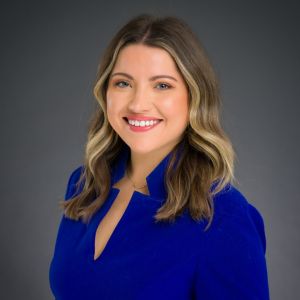St. Jude Family of Websites
Explore our cutting edge research, world-class patient care, career opportunities and more.
St. Jude Children's Research Hospital Home

- Fundraising
St. Jude Family of Websites
Explore our cutting edge research, world-class patient care, career opportunities and more.
St. Jude Children's Research Hospital Home

- Fundraising
High school research program inspires future scientists

Hong Lin, PhD, works in the laboratory with mentees Kayla Henry and Emily Zhao.
School might break for the summer, but across Memphis, the home of St. Jude Children’s Research Hospital, students are participating in a unique STEMM experience. The High School Research Immersion Program, run by the St. Jude STEMM Education & Outreach Program, gives rising high school seniors hands-on experience in research laboratories at St. Jude. In its second year, the program’s participation has doubled, with 32 students and 16 mentors.
Each mentor leads two students in daily experiments and helps them prepare for a final project, which they present at the end of the eight-week summer program. The projects are displayed both at St. Jude and in a public exhibition in Memphis to highlight the students’ achievements over the summer and celebrate their progress.
Gwen Alexander, PhD, leads the High School Research Immersion Program. She said early exposure to biomedical careers helps cultivate student’s interest in science.
“Our goal is to give these students an opportunity to get into a lab and participate in research. St. Jude wants to be part of the pipeline of putting students into this field,” Alexander said.
Learning from scientists themselves
For mentors, this program gives them a chance to inspire the next generation of scientists. Ombeni Idassi, MHS, St. Jude Department of Global Pediatric Medicine, hopes it propels the students toward a career in medicine, scientific research or public health.
“Students gain experience in science from a world-class organization. I want to guide them in their journey and help them succeed,” Idassi said.
Kayla Tucker, a mentee from Middle College High School, works with Idassi, researching sickle cell disease policy in different countries.
“Even when I don’t understand the research, he is patient and takes the time to explain everything,” Tucker said.
She said the program solidified her desire to work in the medical field and that she hopes to become a nurse.
“This program opened so many opportunities for me,” Tucker said. “It’s great because you get to experience new things every day.”
Hong Lin, PhD, St. Jude Department of Developmental Neurobiology, is in her second year of mentoring students in the program. She wants to participate because she’s seen firsthand the impact of positive mentorship.
“Many high school students are not getting exposed to research. During this program, I see them grow into scientists,” Lin, who works in the laboratory of Paul Northcott, PhD, said.
Emily Zhao, a mentee from St. George’s Independent School, remembers having a passion for science since childhood. She said Lin’s mentorship inspired her to pursue a career in biomedical research.
“Women in STEMM are important, and I’m thankful to work with a woman who looks like me. It feels great to have a role model that I can see myself being like one day,” Zhao said.
Lin said the key to being a great mentor is helping the students recognize their strengths and build their confidence. She starts the summer by explaining the importance of research and teaching the fundamentals. The students perform experiments and collect data during the program’s second half. By the end of the eight weeks, the students have the scientific knowledge to communicate their results effectively.
“I want to cultivate their passion for research so they have compassion for the patient and passion for the science,” Lin said. “We connect even the small daily experiments to the bigger goal of helping the patients.”
Creating a path toward future careers in science
In addition to research experience, the program teaches mentees about college readiness and provides weekly workshops for fostering science identity. Alexander said they want to prepare students for college and the next steps in a biomedical career.
“We want to give high school students the opportunity to learn about research, but also couple that with building and understanding their place in science,” Alexander said. “We are being intentional to help them share their story in science.”






